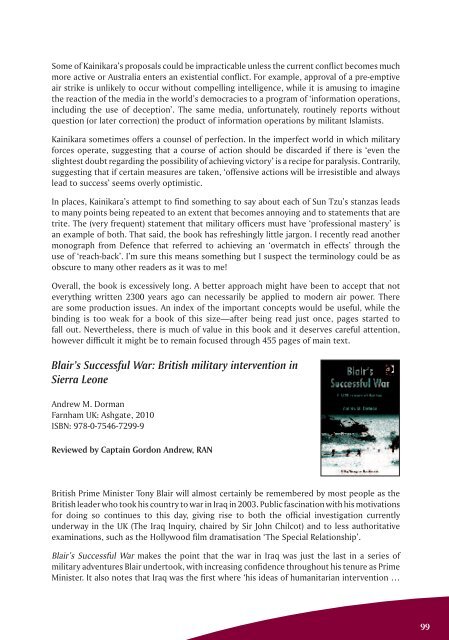ISSUE 183 : Nov/Dec - 2010 - Australian Defence Force Journal
ISSUE 183 : Nov/Dec - 2010 - Australian Defence Force Journal
ISSUE 183 : Nov/Dec - 2010 - Australian Defence Force Journal
You also want an ePaper? Increase the reach of your titles
YUMPU automatically turns print PDFs into web optimized ePapers that Google loves.
Some of Kainikara’s proposals could be impracticable unless the current conflict becomes muchmore active or Australia enters an existential conflict. For example, approval of a pre-emptiveair strike is unlikely to occur without compelling intelligence, while it is amusing to imaginethe reaction of the media in the world’s democracies to a program of ‘information operations,including the use of deception’. The same media, unfortunately, routinely reports withoutquestion (or later correction) the product of information operations by militant Islamists.Kainikara sometimes offers a counsel of perfection. In the imperfect world in which militaryforces operate, suggesting that a course of action should be discarded if there is ‘even theslightest doubt regarding the possibility of achieving victory’ is a recipe for paralysis. Contrarily,suggesting that if certain measures are taken, ‘offensive actions will be irresistible and alwayslead to success’ seems overly optimistic.In places, Kainikara’s attempt to find something to say about each of Sun Tzu’s stanzas leadsto many points being repeated to an extent that becomes annoying and to statements that aretrite. The (very frequent) statement that military officers must have ‘professional mastery’ isan example of both. That said, the book has refreshingly little jargon. I recently read anothermonograph from <strong>Defence</strong> that referred to achieving an ‘overmatch in effects’ through theuse of ‘reach-back’. I’m sure this means something but I suspect the terminology could be asobscure to many other readers as it was to me!Overall, the book is excessively long. A better approach might have been to accept that noteverything written 2300 years ago can necessarily be applied to modern air power. Thereare some production issues. An index of the important concepts would be useful, while thebinding is too weak for a book of this size—after being read just once, pages started tofall out. Nevertheless, there is much of value in this book and it deserves careful attention,however difficult it might be to remain focused through 455 pages of main text.Blair’s Successful War: British military intervention inSierra LeoneAndrew M. DormanFarnham UK: Ashgate, <strong>2010</strong>ISBN: 978-0-7546-7299-9Reviewed by Captain Gordon Andrew, RANBritish Prime Minister Tony Blair will almost certainly be remembered by most people as theBritish leader who took his country to war in Iraq in 2003. Public fascination with his motivationsfor doing so continues to this day, giving rise to both the official investigation currentlyunderway in the UK (The Iraq Inquiry, chaired by Sir John Chilcot) and to less authoritativeexaminations, such as the Hollywood film dramatisation ‘The Special Relationship’.Blair’s Successful War makes the point that the war in Iraq was just the last in a series ofmilitary adventures Blair undertook, with increasing confidence throughout his tenure as PrimeMinister. It also notes that Iraq was the first where ‘his ideas of humanitarian intervention …99
















